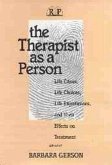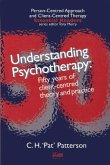Lisbeth Sommerbeck
Therapist Limits in Person-Centred Practice
24,99 €
inkl. MwSt.
Versandfertig in über 4 Wochen

12 °P sammeln
Lisbeth Sommerbeck
Therapist Limits in Person-Centred Practice
- Broschiertes Buch
- Merkliste
- Auf die Merkliste
- Bewerten Bewerten
- Teilen
- Produkt teilen
- Produkterinnerung
- Produkterinnerung
Sommerbeck provides a straightforward appreciation of the problems and offers solutions to working with clients with severe mental health problems.
Andere Kunden interessierten sich auch für
![Person-Centred Communication: Theory, Skills and Practice Person-Centred Communication: Theory, Skills and Practice]() Renate MotschnigPerson-Centred Communication: Theory, Skills and Practice49,99 €
Renate MotschnigPerson-Centred Communication: Theory, Skills and Practice49,99 €![The Therapist as a Person The Therapist as a Person]() The Therapist as a Person83,99 €
The Therapist as a Person83,99 €![Understanding Psychotherapy: Fifty Years of Client-Centred Theory and Practice Understanding Psychotherapy: Fifty Years of Client-Centred Theory and Practice]() C. H. 'Pat' PattersonUnderstanding Psychotherapy: Fifty Years of Client-Centred Theory and Practice37,99 €
C. H. 'Pat' PattersonUnderstanding Psychotherapy: Fifty Years of Client-Centred Theory and Practice37,99 €![Is there still time to run?: A message from your therapist before your session Is there still time to run?: A message from your therapist before your session]() Carolyn KlassenIs there still time to run?: A message from your therapist before your session16,99 €
Carolyn KlassenIs there still time to run?: A message from your therapist before your session16,99 €![The Boundaried Therapist The Boundaried Therapist]() Nicole PerryThe Boundaried Therapist35,99 €
Nicole PerryThe Boundaried Therapist35,99 €![To Lead an Honorable Life: Invitations to Think about Client-Centered Therapy and the Person-Centered Approach To Lead an Honorable Life: Invitations to Think about Client-Centered Therapy and the Person-Centered Approach]() John ShlienTo Lead an Honorable Life: Invitations to Think about Client-Centered Therapy and the Person-Centered Approach34,99 €
John ShlienTo Lead an Honorable Life: Invitations to Think about Client-Centered Therapy and the Person-Centered Approach34,99 €![Therapist Into Coach Therapist Into Coach]() Julia Vaughan SmithTherapist Into Coach40,99 €
Julia Vaughan SmithTherapist Into Coach40,99 €-
-
-
Sommerbeck provides a straightforward appreciation of the problems and offers solutions to working with clients with severe mental health problems.
Hinweis: Dieser Artikel kann nur an eine deutsche Lieferadresse ausgeliefert werden.
Hinweis: Dieser Artikel kann nur an eine deutsche Lieferadresse ausgeliefert werden.
Produktdetails
- Produktdetails
- Verlag: Pccs Books
- Seitenzahl: 120
- Erscheinungstermin: 13. September 2016
- Englisch
- Abmessung: 211mm x 137mm x 8mm
- Gewicht: 159g
- ISBN-13: 9781906254810
- ISBN-10: 1906254818
- Artikelnr.: 43368646
- Herstellerkennzeichnung
- Libri GmbH
- Europaallee 1
- 36244 Bad Hersfeld
- gpsr@libri.de
- Verlag: Pccs Books
- Seitenzahl: 120
- Erscheinungstermin: 13. September 2016
- Englisch
- Abmessung: 211mm x 137mm x 8mm
- Gewicht: 159g
- ISBN-13: 9781906254810
- ISBN-10: 1906254818
- Artikelnr.: 43368646
- Herstellerkennzeichnung
- Libri GmbH
- Europaallee 1
- 36244 Bad Hersfeld
- gpsr@libri.de
Lisbeth Sommerbeck is a clinical psychologist, accredited as a specialist in psychotherapy and supervision by the Danish Psychological Association. Since 1974 and until she retired in 2011 she was employed in Danish psychiatry, where the bulk of her work consisted in psychotherapy, supervision, consultation and teaching. She has written books and articles about various aspects of client-centred therapy and in 2002 she initiated the Danish Carl Rogers Forum.
Introduction
1. Limits of therapeutic competence
Limits and congruence
Limits in the therapist's experience of empathic understanding
When feeling out of contact with the client
When the therapist is the target of extreme affects
When the therapist misses a red thread
When empathic understanding is difficult to communicate
Limits in the therapist's experience of unconditional positive regard
Limits of acceptance and therapist transparency
Helpful ways of thinking that promote acceptance
Contractual limits on unconditionally positive regard.
2. Limit setting
The essence of limit setting in person-centred therapy
Some common limit-setting issues
Limits with respect to suicidal behavior
Limits with respect to violent behaviour Idiosyncratic limits
3. Contextual limits
A personal history of being a non-expert on clients in an expert's setting
When the therapist is free to practise fully person-centred
Assessing and diagnosing
The end of being a non-expert on clients in an expert's setting
The insidious contagion of contextual rules
Limits on number of sessions
4. Limits as 'time out'
Limits to answering client question
Limits to therapist self-expression
Limits to extra-therapeutic relationships with clients
5. Limits and referrals
6. Finishing comments
References
1. Limits of therapeutic competence
Limits and congruence
Limits in the therapist's experience of empathic understanding
When feeling out of contact with the client
When the therapist is the target of extreme affects
When the therapist misses a red thread
When empathic understanding is difficult to communicate
Limits in the therapist's experience of unconditional positive regard
Limits of acceptance and therapist transparency
Helpful ways of thinking that promote acceptance
Contractual limits on unconditionally positive regard.
2. Limit setting
The essence of limit setting in person-centred therapy
Some common limit-setting issues
Limits with respect to suicidal behavior
Limits with respect to violent behaviour Idiosyncratic limits
3. Contextual limits
A personal history of being a non-expert on clients in an expert's setting
When the therapist is free to practise fully person-centred
Assessing and diagnosing
The end of being a non-expert on clients in an expert's setting
The insidious contagion of contextual rules
Limits on number of sessions
4. Limits as 'time out'
Limits to answering client question
Limits to therapist self-expression
Limits to extra-therapeutic relationships with clients
5. Limits and referrals
6. Finishing comments
References
Introduction
1. Limits of therapeutic competence
Limits and congruence
Limits in the therapist's experience of empathic understanding
When feeling out of contact with the client
When the therapist is the target of extreme affects
When the therapist misses a red thread
When empathic understanding is difficult to communicate
Limits in the therapist's experience of unconditional positive regard
Limits of acceptance and therapist transparency
Helpful ways of thinking that promote acceptance
Contractual limits on unconditionally positive regard.
2. Limit setting
The essence of limit setting in person-centred therapy
Some common limit-setting issues
Limits with respect to suicidal behavior
Limits with respect to violent behaviour Idiosyncratic limits
3. Contextual limits
A personal history of being a non-expert on clients in an expert's setting
When the therapist is free to practise fully person-centred
Assessing and diagnosing
The end of being a non-expert on clients in an expert's setting
The insidious contagion of contextual rules
Limits on number of sessions
4. Limits as 'time out'
Limits to answering client question
Limits to therapist self-expression
Limits to extra-therapeutic relationships with clients
5. Limits and referrals
6. Finishing comments
References
1. Limits of therapeutic competence
Limits and congruence
Limits in the therapist's experience of empathic understanding
When feeling out of contact with the client
When the therapist is the target of extreme affects
When the therapist misses a red thread
When empathic understanding is difficult to communicate
Limits in the therapist's experience of unconditional positive regard
Limits of acceptance and therapist transparency
Helpful ways of thinking that promote acceptance
Contractual limits on unconditionally positive regard.
2. Limit setting
The essence of limit setting in person-centred therapy
Some common limit-setting issues
Limits with respect to suicidal behavior
Limits with respect to violent behaviour Idiosyncratic limits
3. Contextual limits
A personal history of being a non-expert on clients in an expert's setting
When the therapist is free to practise fully person-centred
Assessing and diagnosing
The end of being a non-expert on clients in an expert's setting
The insidious contagion of contextual rules
Limits on number of sessions
4. Limits as 'time out'
Limits to answering client question
Limits to therapist self-expression
Limits to extra-therapeutic relationships with clients
5. Limits and referrals
6. Finishing comments
References







